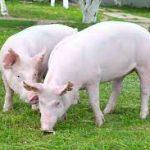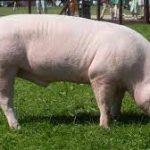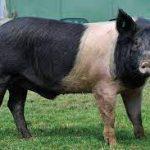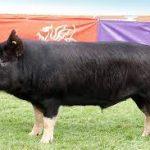When it comes to commercial pig farming for pork production, selecting the right pig breed is key to success. The choice of pig breed directly impacts the quality of the pork and increases profitability. In this article, we will explore the best pig breeds for commercial farming, focusing on the different breeds of pigs and their characteristics. This will allow you to understand the best pig breeds for commercial farming.
The Best Breeds of Pigs for Pork Production
Commercial pig farming requires breeds that exhibit fast growth rates, high feed efficiency, good mothering abilities, and high-quality meat. Below are the best pig breeds that are great for pork production.
Yorkshire Pigs
Yorkshire pig, commonly referred to as “The Large White” has established itself as a favored choice for commercial pig farming on a global scale. It is one of the most common pig breeds. It is known for its fast growth rate, efficient feed conversion, and production of lean meat.
One good characteristics of the Yorkshire pig is its ability to adapt to varying environmental conditions. This adaptability makes it well-suited for the diverse regions of Nigeria, where climate and farming conditions can differ significantly. The breed’s adaptability ensures farmerss can successfully rear Yorkshire pigs in different regions, optimizing their productivity and overall success in commercial pig farming.
Yorkshire pig consistently produces a large litter, contributing to higher productivity on the farm. The combination of a robust maternal instinct and larger litter sizes reduces the need for additional breeding stock and increases the potential for higher piglet survival rates, ultimately leading to increased profitability for your pork business.
The meat from Yorkshire Pigs is tender and rich in flavor. Its texture contributes to the meat’s juiciness and enhances the overall eating experience for consumers. The quality of Yorkshire pork makes it highly sought after in the market, appealing to consumers who appreciate flavorful, tender cuts of meat.
Landrace Pigs
The Landrace breed, originating from Denmark, is renowned in commercial pig farming for its exceptional reproductive performance, efficient feed utilization, and remarkable meat quality. With their long body structure, Landrace pigs yield a greater proportion of usable meat, maximizing pork production and profitability.
Landrace pork is highly regarded for its sweetness, and well-balanced fat composition, suitable for various dishes. These kinds of pigs efficiently convert feed into muscle mass, reducing production costs. The Landrace breed’s excellent mothering ability is another key attribute, consistently producing large litters with high survival rates just like the Yorkshire pig.
Its maternal instincts enhance breed productivity and cost-effectiveness for farmers. Overall, the Landrace breed’s remarkable qualities, including meat yield, pork quality, feed efficiency, and mothering ability, make it a preferred choice in commercial pig farming, contributing to profitability and sustainable production practices.
Duroc Pig
Duroc pigs are highly regarded in commercial pig farming for their exceptional meat quality, adaptability, heat tolerance, docile temperament, and flavor. With their well-developed muscular frame, Duroc pigs yield a greater proportion of high-quality meat, maximizing profitability. They exhibit good foraging capabilities and adaptability to diverse environments, making them suitable for various farming systems and geographical regions.
Their tolerance to heat stress is particularly advantageous in hot climates. Duroc pigs’ docile nature simplifies handling and farm management, reducing stress for both pigs and farmers. The pork derived from Duroc pigs is known for its exceptional flavor, juiciness, and tenderness, making it a preferred choice for premium cuts.
Chefs and food enthusiasts appreciate Duroc pork’s ability to retain its qualities during cooking, resulting in delightful dishes. Overall, Duroc pigs’ distinctive appearance, meat quality, adaptability, and docility make them a valuable breed in commercial pig farming, enhancing profitability, ease of management, and culinary satisfaction.
Hampshire Pig
Hampshire pigs are highly valued in commercial pork production due to their exceptional growth rate, meat quality, calm temperament, and adaptability. With their robust and muscular build, Hampshire pigs achieve a favorable meat-to-fat ratio, producing lean and well-muscled carcasses.
Their rapid growth rate allows you to reach market-ready pigs quickly, enhancing overall productivity. Hampshire pigs’ lean meat quality makes them popular among consumers looking for flavorful and healthy pork options. Their docile temperament simplifies farm management and improves animal welfare.
Hampshire pigs demonstrate adaptability to various climates and farming systems, ensuring their ability to thrive and maintain optimal health. The pork derived from Hampshire pigs is known for its rich flavor and tenderness, appealing to those seeking a delightful culinary experience.
Hampshire pigs’ exceptional growth rate, meat quality, temperament, and adaptability make them a preferred choice in commercial pig farming, benefiting farmers and satisfying consumer demand for lean and flavorful pork.
Pietrain Pigs
Pietrain pigs, originating from Belgium, are highly regarded in Nigeria for their exceptional muscle development, lean meat, and high meat-to-bone ratio. Their well-defined musculature and prominent muscles contribute to their conformation and desirable meat yield, making them a preferred choice for commercial pig farming.
Despite their leanness, the meat from Pietrain pigs is tender, succulent, and flavorful, catering to the health-conscious market’s demand for high-quality meat. The breed’s distinctive coat pattern, featuring black spots on a white background, adds to their marketability and visual appeal.
Pietrain pigs have also demonstrated adaptability to various farming systems and environmental conditions, making them suitable for Nigeria’s diverse regions. This adaptability ensures their potential for success across different farming environments.
The lean pork produced by Pietrains aligns with the growing consumer demand for healthier meat options, presenting an opportunity for pig farmers to meet market needs and capitalize on the breed’s ability to produce lean, high-quality pork. Pietrain pigs have gained recognition in Nigeria for their desirable traits, making them an attractive choice for pig farmers aiming to provide lean, flavorful pork to meet the evolving market demands.
Berkshire Pigs
Berkshire pigs, originating from England, are highly regarded for their exceptional meat quality and unique appearance. With their distinctive black coat and white markings, Berkshire pigs have an aesthetically appealing appearance. The breed’s meat quality is exceptional, characterized by excellent marbling that enhances tenderness, juiciness, and flavor.
Berkshire pork is succulent and moist during cooking, providing a delightful culinary experience with its rich and distinct flavor. The high-fat content of Berkshire pork makes it well-suited for premium pork products and cured meats, such as bacon and sausages, which benefit from the marbled fat.
The breed’s hardiness and adaptability contribute to their cost-effectiveness in commercial pig farming, as they demonstrate efficient feed conversion. Berkshire pigs also have a calm and docile temperament, simplifying handling and management on the farm.
Their adaptability to different environmental conditions enables them to thrive in various climates. Berkshire pigs have highly sought after for their exceptional meat quality, unique appearance, and versatility in culinary applications, making them a favored breed in the pork industry.
Hampshire-Duroc Hybrid Pigs
The Hampshire-Duroc hybrid, a result of crossbreeding Hampshire and Duroc pigs, combines the best qualities of both breeds. It offers advantages in growth rate, meat quality, adaptability, and temperament. The hybrid exhibits an improved growth rate and efficient feed conversion, resulting in faster weight gain and reduced time to market.
The meat quality of the Hampshire-Duroc hybrid is exceptional, with lean, well-muscled carcasses featuring desirable marbling for enhanced flavor, tenderness, and juiciness. The hybrid inherits adaptability from both parent breeds, enabling it to thrive in various climates and farming systems.
This pig breed have a high tolerance to environmental stress and foraging capabilities. Moreover, the hybrid inherits a calm temperament and ease of handling from both breeds, simplifying farm management and reducing stress during routine activities.
The Hampshire-Duroc hybrid presents an ideal option for pig farmers seeking a crossbreed that excels in growth, meat quality, adaptability, and manageability. It combines the genetic strengths of its parent breeds to deliver improved performance, profitability, and marketability, meeting consumer demands for high-quality pork.
Local Pig Breed
Local pig breeds are vital in commercial pig farming as they possess desirable traits and adapt to specific conditions. These indigenous breeds have developed robust immune systems, reducing disease outbreaks and the need for veterinary interventions. They excel in hot climates, tolerating high temperatures and humidity, which is particularly valuable in tropical regions.
Their efficient foraging abilities make them cost-effective, as they rely less on expensive commercial feed, especially in extensive systems. The hardiness and adaptability of local pig breeds enable them to thrive in specific environments, coping with environmental challenges and contributing to productivity and longevity.
Furthermore, local pig breeds offer a cost-effective option for small-scale farmers with limited resources, requiring fewer inputs while maintaining satisfactory productivity levels. Conserving these breeds preserves indigenous genetic resources, ensuring the availability of unique genetic diversity for future generations.
It’s important to note that specific local pig breeds vary by region, reflecting diverse agro-ecological zones and cultural contexts, with each breed having its own characteristics and advantages suited to its area of origin.
Conclusion
By considering the characteristics and suitability of different pig breeds, you can make informed decisions that align with yourr farming objectives, market demands, and local conditions. Careful selection of pig breeds and effective breeding practices are key steps towards achieving profitability and success in commercial pig farming. See the 8 steps to start and maintain a modern pig farm in Nigeria.




